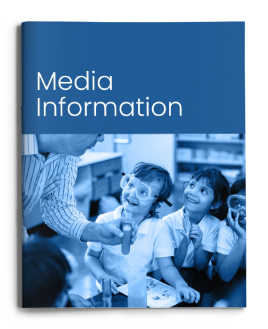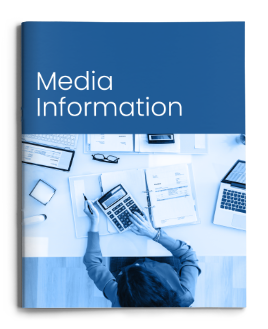Media Packs

Human Times
Put your content in front of 60,000 global key decision-makers in HR every single day at 7.30am when our audience reads their news.

Education Slice
Targeted education news and an audience of 26,000 principals, superintendents, and administrators. Our sponsors' content is front of mind before the school day starts.

Risk Channel
Talk to 12,000 senior risk and compliance leaders exclusively in North America and Europe about your story and how you can help them.

Accountancy Slice
Reach over 15,000 accountancy leaders with your content every single day at 7.30am when they start their day with our latest news, views, trends, and comment impacting the accounting industry across the US.

Legal Slice NA
19,000 senior legal professionals receive Legal Slice NA each morning. If you want to get your story, product, or brand in front of law firms’ owners, partners and practice managers talk to us.

Legal Slice UK
7,000 senior legal professionals receive Legal Slice UK each morning. If you want to get your story, product, or brand in front of law firms’ owners, partners and practice managers talk to us.

Legal Slice Scotland
Every weekday, you could share your content with 9,000 senior Scottish legal professionals. Only one sponsor per industry category so you are never treated like an ‘advert’.

CFO Slice
CFO Slice is read by over 17,000 finance professionals. It is becoming the ‘go-to’ daily read for savvy CFOs. Talk to us now about putting your story in front of them.

Join our Community of Advertisers

ChartHop

Denovo

Enboarder

Galvanize

ManpowerGroup

Mcgraw Hill

Navex Global

Reward Gateway

Sodexo

TrueCue

Visier

Visier
Recent Editions

North America
Human Times
Volkswagen workers at the automaker's plant in Chattanooga, Tennessee, have voted 96% in favor of a historic first labor deal negotiated by the United Auto Workers union that locks in higher wages, lower health insurance costs, and stronger job security language for the next four years. “This victory shows what happens when workers stand up and refuse to be ignored," said Yogi Peoples, a worker at the plant and member of the union's bargaining committee. "We didn’t just win better wages and raise standards at our plant - we forced respect onto the table and got it all in writing." Reuters notes the South of the U.S. "has been tough for the union to crack."
Full Issue
UK
Human Times
Sir Keir Starmer has condemned Reform UK's commitment to repeal the Equalities Act, calling it "shocking." In an interview with BBC Breakfast, the Prime Minister said the laws were "core" to British values and had given "decades of protection," ensuring women and people of all races were "treated equally." Labour's Equalities Act, passed in 2010, contains legal protections against discrimination on the basis of gender, sexuality, race, religion or disability. Suella Braverman, the former Conservative home secretary who was handed Reform UK's education and skills brief on Tuesday, said the country is being "ripped apart by diversity, equality and inclusion," "tokenism" and "victimhood."
Full Issue
USA
Education Slice
The U.S. Supreme Court has struck down President Donald Trump’s sweeping tariff policy in a 6–3 decision, ruling that the International Emergency Economic Powers Act (IEEPA) does not authorize the president to impose tariffs without clear congressional approval. Writing for the majority, Chief Justice John G. Roberts Jr. said the 1977 statute cited by the administration makes no reference to tariffs or duties and therefore does not grant such authority, while three justices dissented, arguing tariffs fall within the law’s power to regulate importation. The case was brought in part by Chicago-area educational toy companies Learning Resources and hand2mind, whose jurisdictional claim was dismissed but whose broader objective of invalidating the tariffs was achieved.
Full Issue
USA
Accountancy Slice
President Donald Trump faces a deadline next week to respond to claims that his $10bn lawsuit against the IRS creates a major conflict of interest, as critics argue he effectively controls both sides of the case. Mr. Trump sued the IRS and the Treasury Department in January, seeking damages over the illegal leak of his tax records by former IRS contractor Charles Littlejohn, who was sentenced to five years in prison. The lawsuit alleges violations of the Privacy Act and other tax laws, and demands $10bn for disclosures made to media outlets including The New York Times and ProPublica. A group of former government officials has asked a federal judge to intervene, arguing that as president, Mr. Trump oversees both the IRS and the Justice Department - the agency responsible for defending the government in court. They warn the case risks becoming “collusive litigation” and have urged the court to appoint an independent party or pause the case until Mr. Trump leaves office. They also argue the damages claim is excessive and may fall outside the statute of limitations.
Full Issue
Scotland
Legal Matters Scotland
Kemi Badenoch, the Conservative leader, announced plans to separate the roles of Scotland's Lord Advocate during the Scottish Tory conference in Edinburgh. This follows revelations that Lord Advocate Dorothy Bain KC informed the First Minister about charges against former SNP chief executive Peter Murrell before they became public. Badenoch commented: "It is an absurd state of affairs that the Lord Advocate is currently in charge of an organisation prosecuting a case against a senior SNP figure whilst being in the SNP Government's Cabinet." The proposal aims to eliminate potential conflicts of interest in the legal system.
Full Issue
North America
Legal Slice
Volkswagen workers at the automaker's plant in Chattanooga, Tennessee, have voted 96% in favor of a historic first labor deal negotiated by the United Auto Workers union that locks in higher wages, lower health insurance costs, and stronger job security language for the next four years. “This victory shows what happens when workers stand up and refuse to be ignored," said Yogi Peoples, a worker at the plant and member of the union's bargaining committee. "We didn’t just win better wages and raise standards at our plant - we forced respect onto the table and got it all in writing." Reuters notes the South of the U.S. "has been tough for the union to crack."
Full Issue
Europe
Risk Channel
Cryptocurrency flows to suspected human trafficking services, largely based in Southeast Asia, grew 85% in 2025, reaching a scale of hundreds of millions across identified services, according to a new report by US-based blockchain analytics firm Chainalysis. The analysis tracked four primary categories of suspected cryptocurrency-facilitated human trafficking, including Telegram-based “labour placement” services that facilitate kidnapping and forced labour for scam compounds.
Full Issue
North America
CFO Slice
Corporate America is scaling back diversity efforts on boards, with S&P 500 companies appointing women and minority directors at rates similar to a decade ago. Nearly 80% of new directors last year were white and about three-quarters were men, marking a sharp decline from diversity gains in 2021. Corporate policies supporting board diversity have also declined. Only about a quarter of S&P 500 companies maintained formal policies last year requiring consideration of gender and racial diversity when appointing directors, down from roughly half the year before. So far this year, that share has fallen to 14%. The retreat comes after legal setbacks, including court rulings striking down California’s board diversity mandates and Nasdaq’s disclosure rule on board diversity. Although overall board demographics remain somewhat more diverse than a decade ago, progress has slowed significantly. At the current pace, boards in the broader Russell 3000 index would not reach gender parity until 2044, according to projections.



